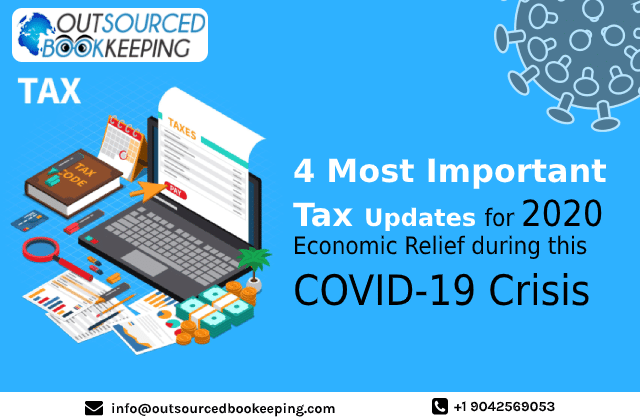The United States has rolled out a slew of tax provisions for businesses in an effort to help the economy from backsliding even more. Tax refund updates and policy changes in combination with businesses loans and unemployment insurance are expected to work in tandem, to give a breather to businesses and individuals in terms of liquidity in the uncertain times of corona pandemic.

While we have already given an overview of the COVID-19 economic relief package here, in this piece let us give you a brief idea on the tax provisions and tax accounting updates enabled by the US govt for both individuals and businesses.
Here are 5 important tax updates for 2020 from the recent economic relief package that you must know:
Employee Retention Credit:
Employee retention credit is designed to help employers retain their employees on their regular payroll. According to this CARES Act, all the eligible employers are entitled to receive 50% of the qualified wages paid to their employees between March 12, 2020, and January 1, 2021. The maximum amount of qualified wage taken into consideration will be $10,000. So eligible employees can receive a maximum of $5000 for each employee in the form of credit.
Employers who are eligible for the Employee Retention Credit are employers who happen to carry their businesses during the 2020 calendar year and are forced to suspend their operational activities due to the public health measures talked by the government. Businesses that experience a considerable loss in gross receipts for a particular quarter when compared to the same quarter in the previous year are also eligible for the ERC program. Government employers and self-employed individuals are not eligible to benefit from this provision.
Deferral of Employer Social Security Tax Payments:
The second tax relief provision enacted to help employers in this uncertain economic slump us deferral of employer Social Security tax payments.
6.2 % on the first $137,700 of employee wages is paid by the employer towards the Social security taxes. And with the newly enacted CARES Act, employers are allowed to defer the payment of these Social Security taxes paid on wages after March. While the deposit due fate for fifty percent of these Social Security taxed is deferred to December 31, 2021, the date of deposit for the remaining 50% of the taxes is deferred to 31 December 2022.
However, this deferral option does not apply in case the business takes the benefit of the Paycheck Protection Program (PPP) under the same CARES Act. So it would be either Paycheck Protection Program or Deferral of Employer Social Security taxes, choose wisely.
Recovery Rebate for Individuals & Households in the form of tax credit:
If you are a US citizen filing your taxes then you are entitled to a minimum of $1200 recovery rebate, while if you are filing your tax returns in joint with your spouse you are entitled to $2400 with an additional $500 per each child.
Individual filers are eligible for a full rebate of $1200 only if the 2020 Annual Gross income (AGI) is below $75k. For a married couple filing jointly the total 2020 Annual Gross Incomes must be below $150k if they are to receive full $2400 tax credit. If your income goes above the threshold, for every $1000 you make, $50 is reduced from your tax credit.
For example, if you are an eligible couple with 2 kids, filing their tax jointly you are entitled to $3400 (2400+500+500) in tax credit. There is no cap on a number of children eligible for the claim. As for the divorced couple, parents who claim the kid in their tax returns receive the payment.
IRS will begin the mailing of the first round of checks based on your 2018 tax return (or 2019, if filed). If you receive a rebate on your 2018 or 2019 tax returns but your 2020 AGI makes you ineligible then you need not pay it back. If you are not eligible for rebate based on your 2018 or 2019 but are eligible in 2020 income you can claim the credit on your 2020 returns.
Extended Carry backs of Net Operating Loss:
Tax Cuts and Jobs Act of 2017 had amended that the Net Operating Loss in 2018 and later cannot be carried back and the only cab offset 80% of the income for carrying over. However CARES Act is an effort to help employers now permit the NOLs generated in 2020, 2019, and 2018 to be carried back 5 years preceding the NOL year. Moreover, the carryback can be used to offset 100% of taxable income overriding the 80% rule of the Tax Cuts and Jobs Act of 2017. However, it must be remembered that businesses that are expecting heavy losses for 2020 will not be able to file the refund for carryback until this tax year is done.
This NOL carryback not only helps with the immediate tax refunds but also gives an opportunity to receive tax savings by using the losses to offset taxable income generated when the tax rated was higher than normal.
All the above 4 tax provisions have both positives and negatives and are subject to change when the normalcy prevails. But all the employers and individual taxpayers must take advantage of these above tax provisions to guard themselves against the economic slump caused by the COVID-19.
Be it for using Net Operating Loss carryback provisions for tax savings, or choosing between PPP and Employer SST payments or help with eligibility for Employer Retention Credit expert tax preparation advisors like us at Outsourced Bookkeeping can truly help you leverage the tax provisions to maximum benefit. You can contact us at outsourced bookkeeping best tax preparation services.








